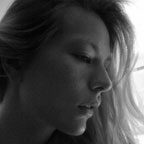



There's a dream in the corner
of the wall the form of a spider,
all legs and eyes. It is not graceful
in its turns; has not sewn webs
or caught flies with its cunning.
No orb or strand of silk exists yet,
no tangle or sticky string. It just sits,
a fleck of brown beard, jawless,
a piece of pulp left at the edge
of an empty glass. Such patience.
I, too, once lay for days on a horizon
of white filament, and days turned
to weeks. I had no plan. Voices rumbled
below my room — a noiseless cavern.
But I was a whole world to myself,
shutting out the sun and moon,
the rhythm of the world. I wove
great stories with the threads of
my mind, stories that took the shape
of memories where I existed at
the center of passionate
embraces, vows of eternal love,
friendships and hardships,
painful betrayals, followed by
sweet surrender and forgiveness.
I felt immortalized like a deity,
stretched out by God
and hung on a high arch; I was
whispered to with songs of
devotion and praise.
But shadows set in, my union
with this universe was severed
and I spent much time afterward
wondering what it had meant,
that world of false echoes where
I was so clearly crying out to be
thought of, to be remembered,
because to be remembered is,
in some way, to be heard.
The spider makes no sound
when sinking its fangs into
the flesh of its prey,
or when it shoots string from
the spigot. But I hear it, at times,
the sting and shoot, growing circular
around the mouths of windows.
I blink twice and the spider
is gone. Each segment
is the size of a star; it bleeds
lymph cells the color of water.
I wait for it in ignorance,
allegorize insincerely. Look,
there, a dream in the corner.
Its ironic, what we say
we want is to be sprung
back into light, from the
placental steps and out
into the world, and yet
we grip our belongings tightly,
we dream of comfortable
things and want the next stop
to be ours, not out of anticipation,
but out of urgency and deadline.
Battered, we rock and depart
faster down the dark canal,
no one looks directly into the
eyes of the other. We hover
around the glass and watch
the reflections, really distortions,
we say, oh yes, this is a better
estimate of our behavior.
The woman flossing certainly
hurts us, the Brooklyn musician,
who hits sticks repetitiously
against the thighs of his legs,
certainly has no way
of seeing what is really
our only hope: the boy,
his skin slick as fresh paint,
grasping to the poll with
the force of infant bird claws.
If we had better instincts
or, if we did not avoid them,
we'd know its dinnertime
and the boy is hungry, but
our body clocks are off,
and the train grumbles
with weak wheels. If we
were not afraid to look at
him we'd see traces of
mother all over his body:
lipstick kiss, elephant mittens,
scrubbed white sneakers housing
the anchors of his feet.
The velocity of the train
is fed by primordial desires:
pushing, yelling, always touching.
But it's a lie: the one with
the most practice will show none of
the fear, will see the boy
and whipser into his ear all
the perversions of our intent.
Together they'll get off at
the quay and we'll keep
riding on our separate journeys,
oblivious, half-sleeping,
our collective body swaying,
stuck in a dream so deep
we never even noticed the wonder:
how the boy's eyes looked like the
muddy waters of a childhood
creek we swam in, how they echoed
distant memory of lullabyes
and of running through forests.
We'll never know how tightly
he held to it, that flat piece
of cardboard, damp from
the sweet sweat of
his palm: our ticket home.
This is not so that I may
free my mind of sin or tell you
the conditions of my love but
she wore the scarf
around her neck, so that
the tassles were flaring
from the back of her body,
against her hips, which,
as a ship on green water,
signaled a kind of distress
that has yet to pass through me
completely.
I used to dress you up blue,
in a fairy godmother satin smock
and glinty diamond crown. I curled
your long black-dusted eyelashes
until they opened up to me
like a geisha fan
showing off your squint,
your thin pretty almond eyes
—that’s what they were,
wedged in soft easy skin.
Not even the cat could suffer long
inside the box of my eye.
You didn’t seem to mind
the tight squeeze between
the bed and the floor. It was
with my thumb and a match box
that I set grand-daddy’s story alight
in our hovering shadows; how quickly
his Appalachian visions
crumbled with the drought,
and got to his brain, like dirt
in water. His body was donated
to science and yes,
under the bed,
we’d be safe.
We were all late for church
on the day of your baptism;
trickling into the last vacant pew
to watch how your head, bent,
took to the pastor’s water,
like a dribbling concave stone.
Saint Conrad of Piacenza
was virtuous; he helped his parents
on the farm. I doubt he had the same
smile, faint as a hair-line and fractured,
nor the rupture of deep cheek pinchings —
holy man's kiss — someone called them, once.
But I still cant remember
who it was that cleaned you up
after I became bored and proclaimed
that playtime was over. Was it mother?
Father? Or maybe you kept yourself, limp that way,
for a while; smart as you were
—how people change their minds so effortlessly
and maybe there will be others
who'll find use
out of the boy who is
somewhere called Saint.
Last night, I held you to my chest,
between the ribs, a cage
that keeps you still.
Tonight, I drive along the rim
of the Potomac, recalling words
my father has spoken,
inconsistent but sharp,
like the crackling of gravel.
He said: animal, orphan, or nomad,
we are all bound to something.
His message was always his voice,
and his voice is a dial tone;
it drowns in music
and dissolves into the tapping of rain.
Without it, there is space for you
to linger. But without it,
I cannot see
past the trees.
You say I am a makeshift
cardboard wreck, pieces
incapable of enduring
or sustaining. I took
your words, cut each letter,
mounted them. They now
dangle across the wall from
my bed. Today, I sit
and watch your words
fall as trees into vents of
a smoking tin radiator.
They go in lengths
as pairs, and come out
quivers of ash; I do not
know how you see
our doings and undoings,
I see them as your hands:
flesh not for rescuing,
but for touching. I strain
through a grey fog,
weave through tightly knit
crossings of a lattice
just to remember their form:
warm, cupped, finding
symmetry along my dark
corners. And with this memory,
each fleck of ash, I know
somewhere oceans are
azure with salt; branches
make a tapestry with leaves.
I shall not pluck them,
such delicate wonders of
the earth: they are you.
Katherine MacCue is a graduate of The George Washington University. She resides in New York though feels she's left pieces of herself in benches beneath the cherry blossoms of Washington, D.C, in a small Abbey with great acoustics in Bourgogne, France, and in the countryside of County Cork, Ireland. Her poetry has been published in various journals including Stone Highway Review and Eunoia Review. She writes with the hope that her work will inspire or move someone, perhaps just one person, the way she was moved by Louise Glück when she called out, “You who do not remember passage from the other world I tell you I could speak again: whatever returns from oblivion returns to find a voice...” If you're interested in learning more about Katherine, you can do so at: Kvmacc.blogspot.com.
SUPPORT THE ARTS
GET A FREE T-SHIRT
DONATE TODAY!
ISSUE:
F A L L
2012
By accessing this site, you accept these Terms and Conditions.
Copyright © 2010-2012 TheWritingDisorder.com ™ — All rights reserved